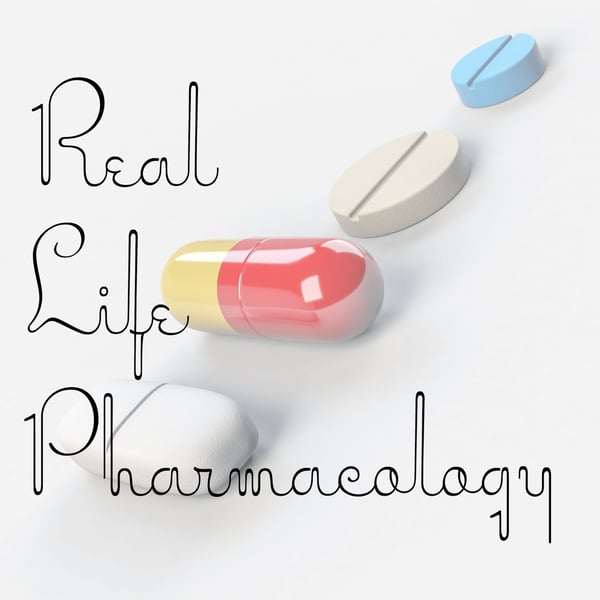Glipizide Pharmacology
Real Life Pharmacology - Pharmacology Education for Health Care Professionals
Eric Christianson, PharmD; Pharmacology Expert and Clinical Pharmacist
5 • 716 Ratings
🗓️ 24 June 2021
⏱️ 13 minutes
🧾️ Download transcript
Summary
Due to the pharmacology of glipizide, the concerning adverse drug reactions are hypoglycemia and weight gain. Other adverse drug reactions include diaphoresis, dizziness, syncope, nervousness, anxiety, tremors, and diarrhea. The contraindications include hypersensitivity, Type 1 Diabetes, and DKA. Glipizide is not used as often due to the risk of hypoglycemia and weight gain. Glipizide is usually dosed once daily, but it can be split up if the dose is escalated. There are differences in administration depending on the formulation. For immediate release formulations, glipizide should be taken 30 minutes before meals to ensure that absorption is stable. For extended formulations, it can be given with breakfast or any other meal.
Of all the sulfonylureas, glipizide is preferred in CKD. Other sulfonylureas, like glyburide, are not preferred due to a decrease in elimination that can result in dose accumulation. In geriatric populations, dosing is less aggressive to lessen the risk of any adverse drug reactions and more specifically hypoglycemia. There’s a risk of cross-reactivity with sulfonamide allergies, but the risk will vary and is low risk. If SJS occurs due to a sulfonamide-containing drug, glipizide likely wouldn’t be recommended.
The drug-drug interactions of glipizide include medications that can increase the risk of hypoglycemia, for example, medications like quinolone antibiotics and B-blockers can mask the symptoms of hypoglycemia. Other interactions include the type where it can counteract the effect of glipizide, for example, medications that can increase blood glucose levels like corticosteroids, antipsychotics such as olanzapine and clozapine, stimulants, and transplant medications like cyclosporine and tacrolimus. There are also CYP interactions that can impact glipizide since it’s metabolized by CYP2C9. More monitoring is warranted when medications that can inhibit CYP2C9, like fluconazole, and medications that can induce CYP2C9, like rifampin, are also given. In cases of overdose, hypoglycemia is most likely to occur. Correction of decreased glucose levels is necessary.
Show notes provided by Chong Yol G Kim, PharmD Student.
Transcript
Click on a timestamp to play from that location
| 0:00.0 | Hey all, welcome back to the Real Life Pharmacology podcast. |
| 0:03.7 | I'm your host, pharmacist Eric Christensen. |
| 0:06.1 | Thank you so much for listening today. |
| 0:08.2 | As always, I want to remind you to go to real-life pharmacology.com and pick up your free 31-page PDF. |
| 0:15.7 | It's a little study guide I put together on the top 200 drugs. |
| 0:20.8 | Definitely a good resource if you're out in |
| 0:23.2 | clinical practice, just a great refresher. Or if you're studying for board exams, things of that |
| 0:28.5 | nature, it's a nice resource to kind of have and lean on just to pick up some important clinical |
| 0:34.4 | pearls or re-remember some of the clinical pearls with these medications. |
| 0:39.6 | So again, real-life pharmacology.com. Go snag that free PDF. |
| 0:44.6 | All right. The drug of the day today is glypozyde. |
| 0:48.5 | Brand name of this medication is Glucatrol. |
| 0:52.0 | And this medication is used for type 2 diabetes. |
| 0:58.2 | Going back, thinking about type 2 diabetes and why blood sugars are elevated, that type |
| 1:05.9 | of thing, insulin is going to play a huge role in lowering blood sugars and helping us get our patients to our A1C goal. |
| 1:17.2 | Insulin is released from the pancreas, specifically from beta cells, and glypozyde actually stimulates the pancreas, or beta cells, to release that insulin. |
| 1:29.8 | And obviously, as we get more insulin into the bloodstream, having its effects, we lower blood sugar. |
| 1:38.5 | Insulin, remember, promotes the storing of glucose, essentially in the liver as glycogen. |
| 1:45.1 | And so that's going to ultimately lower blood sugar. |
| 1:49.1 | Now, side effects, very, very similar to insulin. |
| 1:53.7 | Okay. |
| 1:54.5 | Hypoglycemia and weight gain. |
... |
Please login to see the full transcript.
Disclaimer: The podcast and artwork embedded on this page are from Eric Christianson, PharmD; Pharmacology Expert and Clinical Pharmacist, and are the property of its owner and not affiliated with or endorsed by Tapesearch.
Generated transcripts are the property of Eric Christianson, PharmD; Pharmacology Expert and Clinical Pharmacist and are distributed freely under the Fair Use doctrine. Transcripts generated by Tapesearch are not guaranteed to be accurate.
Copyright © Tapesearch 2025.

